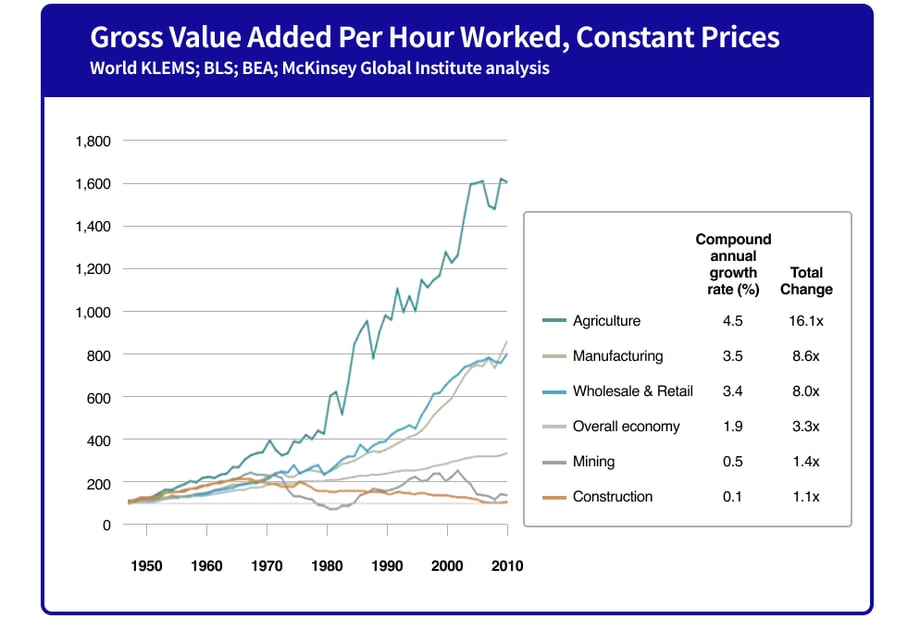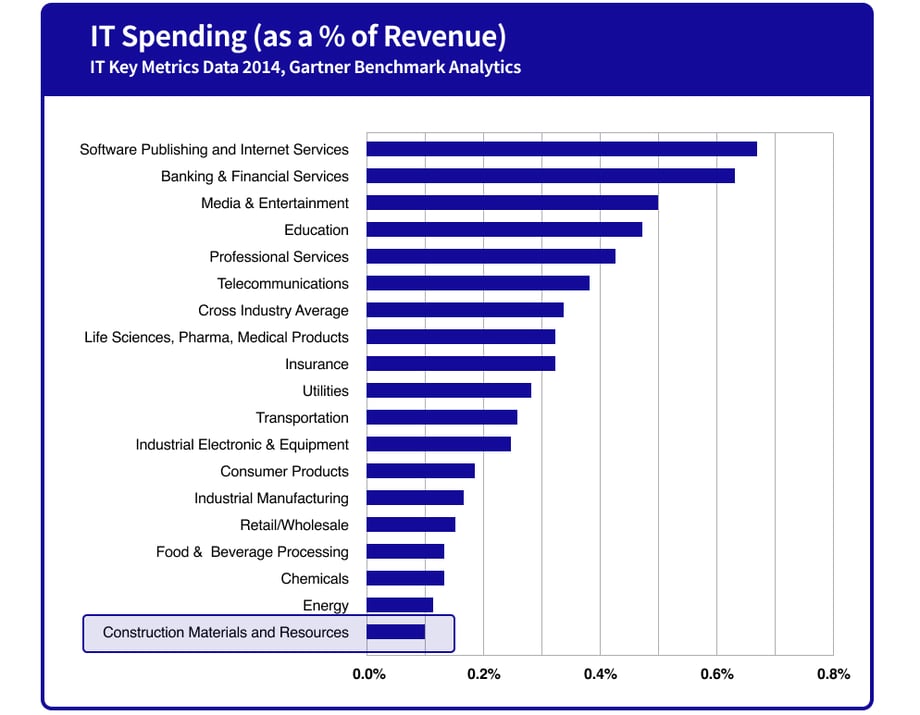Why your construction business should go digital.
The construction industry has long been known for its resistance to change and slow adoption of new technologies. While other industries such as healthcare and finance have rapidly embraced digital transformation, the construction industry has lagged behind.
Consider this graph showing the labor productivity in construction declining since 1968. Much of this can be attributed to the lack of tech adoption in construction and the reduction in skilled labor workforce, among other factors. The construction industry is facing an aging and retiring workforce, increases in project demand and complexity, and a decrease in worker productivity. If nothing changes, the industry as a whole will fail to deliver the infrastructure and housing the world needs. This means that in order for companies to keep up and remain competitive they are going to have to utilize technology to improve their productivity.
In the United States, labor productivity in construction has declined since 1968, in contrast to rising productivity in other sectors.

SOURCE: World KLEMS; BLS; BEA; McKinsey Global Institute Analysis
In this blog post, we will explore some of the reasons why technology adoption is slow in the construction industry, especially excavation and earthmoving, and why other industries – even vertical construction - seem to adopt technology much faster.
Complexity and Fragmentation
One of the main reasons why digital transformation is slow in the construction industry is the complexity and fragmentation of the industry. Unlike other industries, such as healthcare or retail, the construction industry is highly decentralized, with numerous stakeholders involved in every project – even the definition of construction is varied and needs to be clarified in casual conversation. This complexity and fragmentation can make it difficult to implement new technologies, as there are often many different systems and processes that need to be integrated, and each company and type of construction has unique needs.
In addition, the construction industry is known for its reliance on manual processes and paper-based systems. Many construction companies still use paper-based plans and blueprints, which can be time-consuming and error-prone. This reliance on manual processes can make it difficult to adopt new technologies, as there may be resistance to change from workers who are used to doing things a certain way. Lastly, with stretched labor markets, slim margins, and tight schedules, managers and owners are often resistant to adopting modern technology due to the uncertainty of its success within their organization.
High Cost, Low ROI?
Another factor that can hold construction companies back from adopting new technologies is the costs involved. Implementing new technologies can require significant investments in hardware, software, and training, which can be difficult for smaller companies to afford. One rule of thumb, companies should budget between 2-3x the cost of the tech for implementation. In addition, there may be a perception that the ROI for new technologies is unclear or unproven, which can make it difficult to justify the expense. Finally, tracking and validation of an ROI for certain software is an imprecise science and not easily quantifiable. All these factors lead to uncertainty and lower the desire to implement new processes, hardware, and software. Even in regard to safety – where technology seems like an easy adoption – adopting technology can be challenging.
When considering the cost of technology, it’s also important to consider the cost of not adopting. According to industry leader Randy Blount, of Blount Contracting, “If there's something out there that makes you more productive, you have to adopt it. There's no option. If you don't, sooner or later you won't be able to compete. You don't have to be an early adopter, but you have to recognize that adoption is a necessity and if you want to survive, technology is going to be in your business.”
As one Smart Construction customer put it, “Yes, the time and investment hurts at first. That scares some. But I also know the money we invest today in digital technology will pay us back many times over. Maybe not in the first year or even the second. If we didn’t keep up, we’d be history.”
As painful or frustrating as it is to adopt new technology, the cost of not adopting can far outweigh the up-front cost to buy and implement something new. Contractors are finally realizing that technology can be a differentiator for their businesses, not a burden.
Regulatory and Safety Concerns
The construction industry is subject to numerous regulations and safety requirements. Technology is often well suited to cater to these safety needs. That said, the inconsistency of regulations between different municipalities, project owners, and engineers can also make it difficult to adopt new technologies.
There may be concerns about whether new technologies comply with safety regulations, or whether they may introduce new risks or liabilities. In addition, there may be concerns about whether new technologies will integrate with existing systems and processes, or whether they will require significant changes to workflows or procedures.
In some cases, like with drone inspections, regulators have also been slow to accept new technology-driven safety reports, relying instead on “tried and true” manual methods. These uncertainties create anxiety in companies that don’t know what the overall impact the technology will have within their organization.
Since companies can’t anticipate post-adoption issues, this leads to natural resistance and hesitation leaving many companies with a mindset they will adopt when the time is right or the way they are currently doing it is fine. However, a collaborative approach with regulators and proactive adoption of technology that improves safety at jobsites can eliminate this hurdle to technology adoption.
Cultural Resistance to Change
Finally, one of the most significant factors that can hold construction companies back from adopting new technologies is the inherent culture and resistance to change that exists within the industry. The construction industry is known for its traditional and conservative culture, which can make it difficult to embrace new technologies and processes.
Workers may be resistant to change, and there may be a perception that new technologies will replace human workers or eliminate jobs. These factors lead to a large distrust in new technology and how that technology will impact and improve operations within the construction industry. Construction companies need to show their workforce that technology can improve their work, not replace it. In some cases, it can even take over dangerous or menial tasks that workers don’t want to perform in the first place. This can increase everyone’s productivity, allow workers to focus more on the high-value activities of a project, and increase safety dramatically.
It all starts at the top, however. Construction company leaders need to embrace technology and transform the culture of their organizations to pave the way for adoption.
With all of the unique challenges the construction industry faces, it’s important that any new technology a company chooses to adopt takes into account the multi-level complexity that lives within the organization since most solutions will not be a one-size-fits-all fix.
Comparing Construction
Compared to other industries, such as healthcare or finance, the construction industry tends to adopt new technologies more slowly.

There are a few key reasons for this.
- First, as mentioned earlier, the construction industry is highly complex and fragmented, which can make it more difficult to implement new technologies.
- Second, the construction industry is more reliant on physical assets, such as buildings and infrastructure, which can make it more difficult to adopt digital technologies.
- Finally, the construction industry is often more risk-averse than other industries, due to the safety concerns and liability issues mentioned earlier. This risk aversion can make it more difficult to justify investments in new technologies, as there may be a perception that the risks outweigh the potential benefits.
These reasons, and many others, show why the construction industry has been slow to adopt new technologies. However, that trend is changing as companies realize the need for digital transformation.
Start Your Digital Transformation Journey with Smart Construction
In conclusion, the construction industry has been slow to adopt new technologies for a variety of reasons, including complexity and fragmentation, cost concerns, regulatory and safety concerns, and cultural resistance to change. However, there is increasing recognition that digital transformation is necessary for the industry to remain competitive and efficient.
Construction companies are starting to embrace technology, especially as new platforms make it easier for them to do so. Smart Construction is one such platform. Smart Construction’s cloud-based solutions are easy to learn & use, and they improve productivity and safety in the field and the office.
Smart Construction is here to help companies navigate the digital transformation journey. At Smart Construction we understand the concerns our clients have about adopting new technology and have experts ready to help them overcome the perceived barriers discussed above.
Adoption isn't just implementing new software; it's truly implementing its capabilities within your organization. Through Earthbrain’s Accelerator program, Optimization Consultants work individually with companies not only to assist them with adopting new technology but also to identify existing issues and implement strategic workflows, policies, and procedures to set them up for success. By embracing new technologies and processes, construction companies can improve efficiency, reduce costs, improve safety and quality, and remain competitive within the industry. Without technology adoption, companies can risk losing to competition that has adopted new technologies and process to gain advantages on projects.
Contact us to learn more about Smart Construction and how we can help you start your digital transformation journey today.
Featured Resources:
| Blog: Digital Twins: Advancing Digital Transformation of the Construction Industry | Blog: How Construction Technology Improves Trust & Efficiency |
Subscribe to get the latest data & insights.
Fill out the form to get notified when we publish new resources, press updates, and more.
